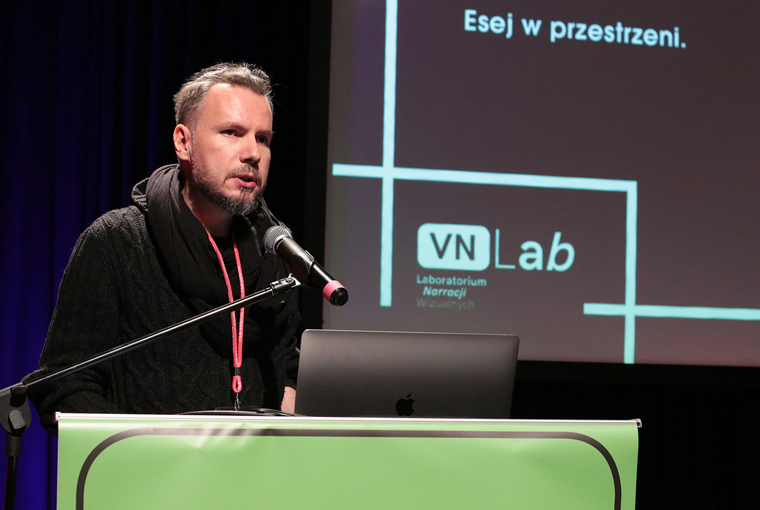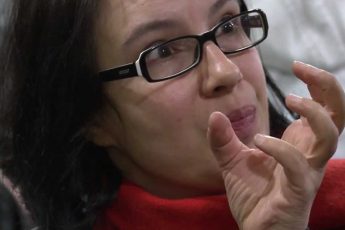
We met Kuba Mikurda to discuss his documentary “Escape to the Silver Globe”, which retraces the complicated political context and production process of Andrzej Żuławski’s film “On the Silver Globe”. The doc equally discusses Żuławski’s career both in his native Poland and in his adopted home France. Mikurda discusses the work of Żuławski, his relationship with Andrzej Wajda, and the history of Polish cinema in the sixties and seventies.
Judging by the title of your documentary, I guess audiences would expect it to be a making of for On the Silver Globe, but your film also engages with the life of Andrzej Żuławski. Was this intended from the beginning?
The starting point was Żuławski’s film On the Silver Globe itself. In fact, the initial starting point was a memory from my childhood. I saw the film in the cinema when it was released in early 1989. The film struck theaters like a meteorite. It was shown for a while, before it completely disappeared. And I remember seeing a magazine with an image from On the Silver Globe on the cover. Being an 8-year-old cinephile, and having watched a lot of sci-fi films on VHS tapes – mostly from the U.S., like E.T. or Back to the Future or Alien – I remember being surprised and taken aback by the images. These were images I couldn’t understand, strangely fascinating and repulsive at the same time. They stuck with me for many years after, and it was only later that I connected the dots, only later that I realized there was a political substratum and a personal history to it all.
Żuławski’s constant travels between Poland and France open up a political question, which is inseparable from his émigré life story. It is quite evident that the political background story you uncover does not adhere to the cliché of a good capitalist taking on the bad Commies. Was this a cliché you were consciously trying to avoid?
It has a lot to do with Żuławski himself, with his relationship with both Poland and the West, which is an atypical one. The typical dream of a Polish filmmaker at the time would have been to start their career in Poland and, if the opportunity arises, to emigrate to the West. But because he had already spent some time – possibly his formative years – in Paris, that is, in one of the capitals of the West at the time, Żuławski could afford to say that Paris was no paradise. There were limitations and disadvantages to that environment too.
And he was good at playing this card both ways. In Poland, he would raise eyebrows by saying that the West is not the ideal place to be, and in Paris he would say, ‘You don’t know what life is all about. We know this. We, who live in the East.’ He always said that one of the reasons he wanted to go back to Poland and make films there was that in his opinion cinema in Poland at that time still meant something, and he had the impression that it didn’t work that way in the West. He thought that cinema in the West – and possibly this is a cliché – was mostly a commercial endeavor, whereas in Poland it still mattered because there was this special relationship between directors and audiences, and over the heads of the censors, there was a dialogue happening, an engagement. And there was definitely a different production context: films in Poland were funded by the state, so it wasn’t about the market value and whether a film would work at the box office, but about whether a project was feasible or not. This is something I focused on in my film, and I guess it shows in the way we depict France and Poland at that time.
The early seventies are also a particular time in the history of Polish cinema – it was the time of big-budget historical epics; and the policy of Edward Gierek’s government at the time was to show that Poland was more open than you’d think, that it was more liberal than you’d think, so that it could well end up becoming an industrial power. Part of this policy was addressed to foreign countries: ‘Let’s show them we can do it! Look at our cinema! We have the resources and the talents!’ We had a lot of discussions about how to make this digestible, particularly for foreign audiences, in order to show them that the environment Żuławski operated within was very different from what the cliché you mentioned would suggest.
This is a challenge vis-à-vis Eastern European and Polish audiences as well…
Yes, especially when it comes to younger generations. We have this wave of anticommunism, which makes everyone blind to everything that happened during the period. So for people to learn that there was something quite spectacular about the cinema of that time, and that the environment was less oppressive than you’d think, at least at particular moments, I think that might be a discovery to many.
Why do you think Żuławski made his gloomy The Devil when he was first invited to return to Poland? As you mentioned, they were making all these historical epics at the time. Was he consciously aiming for the unexpected?
In my opinion The Devil is part of his struggle with Andrzej Wajda in a way, because he was Wajda’s assistant on a few films. Żuławski, I think, had a very different idea of Polish history than Wajda did. They would often talk about The Devil and Wajda would not agree with him. Żuławski’s Weltanschauung was much more pessimistic and mystical, which would jar with Wajda’s much more rationalistic and optimistic outlook. So the film was an answer to that.
Żuławski was also very aware of what was going on in Western cinema at that time, of the way in which violence infiltrated film – particularly in the cinema of Sam Peckinpah – so I guess he also wanted to experiment with horror elements, because the film is very gory. From a genre perspective, it’s a horror film. He was also fascinated with a certain idea of Gnosticism, meaning he saw the world as having been created by an evil demiurge.
He said that The Devil was stopped for political reasons, and there is indeed this element of the devil tempting a young guy and making him betray his older peers, which could be said to draw a parallel to 1968 and the student revolts in Poland, but there is so much more going on in the film that it’s difficult for me to focus on this aspect. I wouldn’t have gotten it if he hadn’t told me it was there. I’m not so sure it was stopped for political reasons. The censors probably just didn’t know what to make of it. It was too gory and pornographic (there is an incestuous relationship between son and mother), and the censors may have thought to themselves, ‘It’s excessive, let’s shelve it!’
The funny coda to the story, however, is that when the film was rediscovered after all this time, the copy they found was totally worn out. It seems that someone had watched it again and again, and I asked the head of the cinematheque what was up with that. He told me that it was screened for party members and their families several times per week.
Your work with cinematographer Radosław Ładczuk mirrors Żuławski’s own style. Again, the question is: were you consciously trying to achieve that bluish, melancholic palette we see in On the Silver Globe?
The idea was not to make it similar so as to avoid a competition between our footage and On the Silver Globe, which has a very distinct look. On the Silver Globe was actually going to be two different films, or rather consist of two parts, each of which adapted two of the three graphic novels that constituted the literary source for the film. The first and the second parts are very different in style. The first part is the bluish one, so to speak, while the second, called “The Conqueror”, is much more colorful. I wanted the audience to step out of the theater with something literally “blue,” which is why I kept our footage black and white – except at places where images were paler or more silvery, so that these bluish elements would stand out.
This film feels like you’re heading for a trilogy. First you tackled Borowczyk, then Żuławski – is there a third director whose life you want to explore?
This is a big question. In a way, my next project is very different because it is an attempt to make a found-footage adaptation of Solaris by Stanisław Lem. During the production of Escape to the Silver Globe, I got to know the archives of the Educational Film Studio in Łódź. A lot of material is stored there, including a lot of 1960s educational films about outer space. Since Lem wrote Solaris in 1961, I wondered, ‘How about we use the materials to document the technological and epistemological moment Lem found himself in while writing his book? How about we illustrate Lem’s book with these materials?’
It would be a more experimental kind of piece, and I don’t know what will come of it, but I am very excited about it. I have a kind of sixties fetish. We even joked that this next project will be like Ida in space. Meaning we’ll have this sixties imagery but the subject will be sci-fi. We’re also thinking of using experimental music that was produced at the studios of the Polish Radio, which we also found in the archives, and which was very prominent at that time. I love archives. The sky is the limit in terms of what you can discover in them.
Thank you for the interview.




Leave a Comment